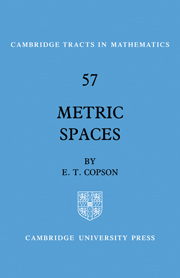7 - Functions and Mappings
Published online by Cambridge University Press: 06 January 2010
Summary
Functions defined on an abstract set
This chapter is concerned with the extension of the idea of continuity to a function defined on an abstract set and taking values in an abstract set, possibly the same set. We recall the definition of a function or mapping given in Chapter 1.
Let E1 and E2 be two non-empty sets. By a mapping f of E1into E2 we mean a relation which associates with each element a of E1 a single well-defined element of E2 denoted by f(a) and called the image of a under the mapping f. The mapping f of E1 into E2 is denoted by f: E1 → E2. The set E1 is called the domain of the mapping; the set {f(a): α ∈ E1 of all points of E2 which are images of points of E2 is called the range of f. The range may be a proper subset of E2; it may even be a single point, in which case the mapping is called a constant mapping. A function is, by definition, one-valued.
Another way of picturing a mapping is a generalization of the graph of elementary calculus. Consider the Cartesian product E1 × E2 which is the set of all ordered pairs (x,y) where x ∈ E1, y ∈ E2 A mapping or function f: E1 → E2 is a particular sort of subset of E1 × E2; a subset with the property that, amongst the ordered pairs (x, y) which form the function, each point a of E1 occurs once and once only.
- Type
- Chapter
- Information
- Metric Spaces , pp. 85 - 110Publisher: Cambridge University PressPrint publication year: 1968

